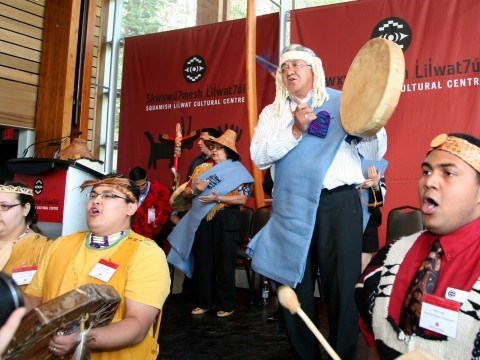First Nations are moving forward with development of their legacy lands in Whistler, striking a new partnership deal to build out their land in Alpine North.
The deal will wipe out their $14 million debt on the Squamish and Lil'wat Cultural Centre and see the development of the last remaining residential subdivision in Whistler.
With recent approval from both band councils, the two nations are now in a joint venture partnership with Whistler-based Bethel Lands Corporation to develop the land above the Rainbow subdivision.
In addition to clearing the debt, the nations will get money as the land is developed. That will help with the ongoing operations of their leading edge cultural centre in the heart of Whistler.
"There are other mechanisms that kick in over time," explained Squamish Chief Gibby Jacob, without elaborating on the finer points of the deal.
In an earlier interview with Pique Lil'wat Chief Leonard Andrew confirmed his council approved the deal last week and explained that finding a way to pay off the cultural centre debt was always on their agenda.
"It's always been our plan to find a way to pay it off," he said.
Construction on the cultural centre took place during one of the biggest construction booms in the province.
Like other construction projects built three years ago, such as the Whistler Public Library, the centre's budget was severely strained, in the end more than doubling to a final tally of $31 million.
Jacob said his community "took a leap of faith" in borrowing the $14 million to complete the project.
The chiefs promised their members that the debt would not impact services.
At the same time as construction was underway, the two nations became the largest private landowner in Whistler after negotiating for 300 acres of legacy land in return for their support of the 2010 Games. The Resort Municipality of Whistler (RMOW) also received 300 acres of Crown land.
The 22-acre Alpine North site was the choicest piece of property because Whistler council agreed to zone the land for 48 single-family homes and 41 townhouses.
The deal has a two-fold benefit to the nations. Not only will the upfront cash erase the burden of their debt, the partnership will also create ongoing opportunities for members of both First Nations communities.
"The partnership with Bethel Lands will see our people working on home construction which will take them right through the apprenticeship program to become journeyman carpenters," Jacob said.
He hopes that there will be opportunity for the 51 per cent Squamish Nation owned Newhaven Projects to participate in the construction of the Alpine North lands and job opportunities for "as many as possible" of his members.
Creating these opportunities, he said, will lessen the reliance on programs and services provided by Squamish Nation to its members.
"If we don't do things to create opportunities, create careers, create employment... it's going to be way out of control," said Jacob.
He highlighted the partnership success of the Sea to Sky Highway as a model to follow for the Alpine North development.
Roughly 80 First Nations members were employed in the massive upgrade project as agreed in a partnership with Peter Kiewit Sons.
"It surpassed the agreement expectations," said Jacob.
Now some of those 80 employees have the skills and experience to move to other construction jobs and some have been moved to other Kiewit projects.
Those are the kinds of success stories Jacob hopes will come out of the development of the legacy lands.
The housing development will begin in the spring of 2010 and will continue over several years.
Jacob said three companies responded to their request for proposals to partner on the land and Bethel came out on top.
Bethel is the same company that built housing for Quest University and the Amblepath subdivision in Squamish.
Another critical portion of the First Nations' legacy lands is the five-acre site in Function Junction, zoned for a gas station and other commercial development.
Though the plan is to have the gas station up and running by February 2010 for the Olympic Games, Jacob is unsure of that timeline. He has also said that First Nations are not in the gas station business. They have yet to strike a deal with a major oil company.
"I don't know," he said of the 2010 timeframe. "I'm a bit skeptical but it would be nice."




